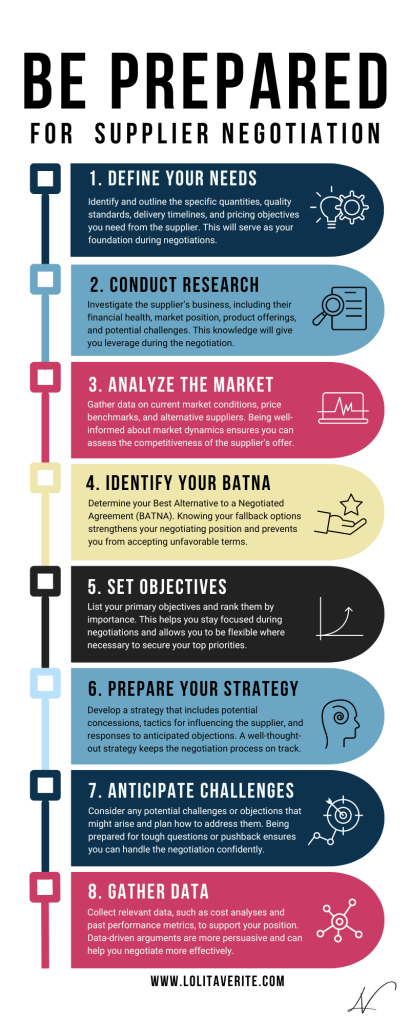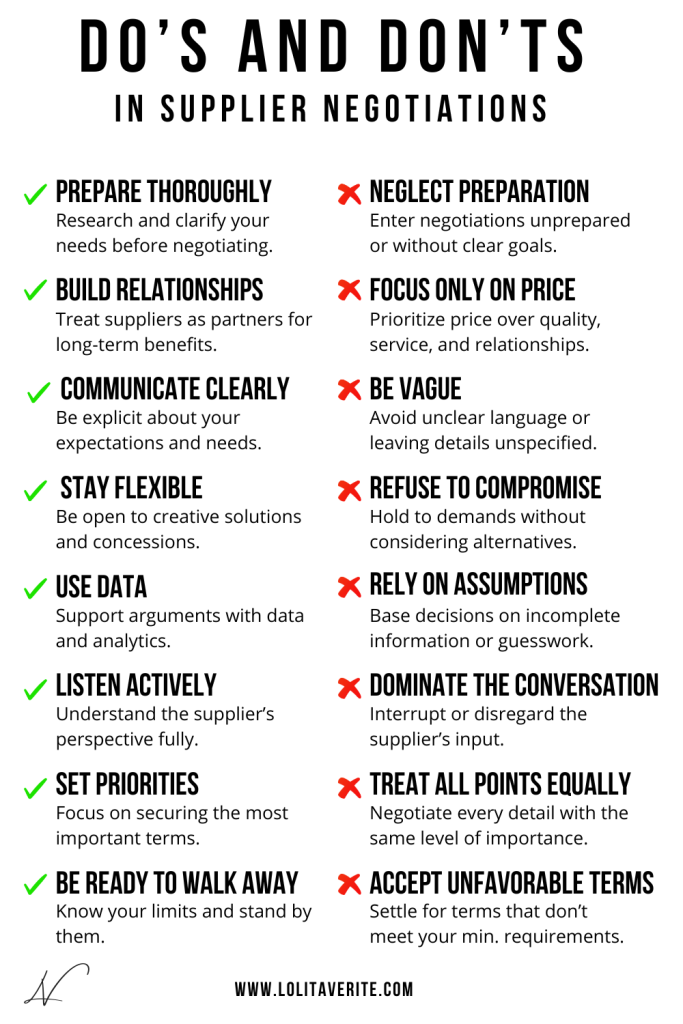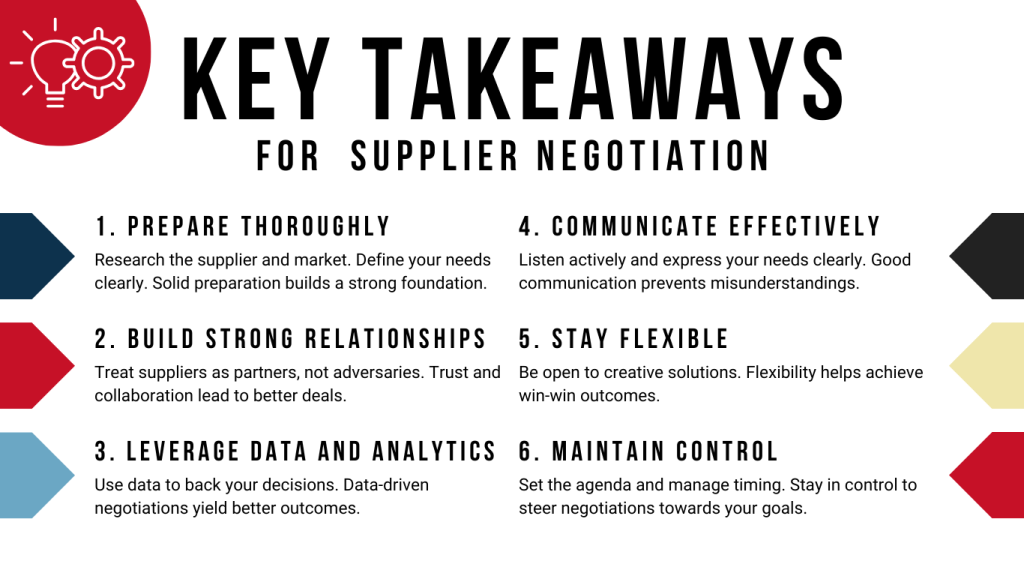Supplier negotiations are a cornerstone of effective procurement. The ability to negotiate well with suppliers can mean the difference between securing favorable terms that enhance your organization’s bottom line or settling for less optimal conditions that could hurt your margins. As a procurement consultant, I’ve seen firsthand how well-executed negotiation strategies can lead to cost savings, improved supplier relationships, and better overall value for your company.
In this article, I’ll share some proven techniques to improve supplier negotiations, helping you achieve better outcomes and build stronger partnerships.
Preparation is Key
Before entering any negotiation, thorough preparation is essential. Start by clearly defining what you need from the supplier, including quantities, quality specifications, delivery timelines, and price points. Having a well-defined set of requirements ensures that you know what you are negotiating for and can keep the conversation focused on achieving those goals.
In addition to understanding your own needs, researching the supplier’s business is crucial. Gather information about their financial health, market position, and the specific product or service they are offering. Understanding their strengths and weaknesses gives you leverage during negotiations and helps you anticipate potential objections or areas where they might be more flexible.
It’s equally important to be well-versed in market trends and pricing benchmarks. Knowing the market allows you to gauge whether the supplier’s offer is competitive. If the supplier senses that you are well-informed, they may be more likely to offer favorable terms to win your business. Furthermore, always have a Best Alternative to a Negotiated Agreement (BATNA) in mind. Knowing your backup options provides a safety net and strengthens your negotiation position, ensuring you don’t settle for less than what is acceptable.

Build Strong Relationships
The importance of building and maintaining strong relationships with suppliers cannot be overstated. Strong relationships foster trust, open communication, and a willingness to collaborate. By treating suppliers as partners rather than adversaries, you create an environment where both parties are more likely to work towards mutually beneficial outcomes.
Regular communication is key to building these relationships. Engage with your suppliers consistently, not just when you need something. This helps you stay informed about their operations and any potential challenges they may face. Mutual respect is also essential—acknowledge their expertise and constraints, and they will likely be more open to negotiating favorable terms.
Long-term partnerships should be the goal rather than short-term gains. Suppliers are more inclined to offer better deals to clients they expect to work with over an extended period. Consider inviting key suppliers to strategic planning sessions, which can help align their goals with yours and foster a collaborative relationship. When suppliers feel valued and integral to your long-term strategy, they are often more willing to accommodate your needs.
For more insight about building supplier relationships, check this post about SRM : L'Importance de la Gestion des Relations avec les Fournisseurs en Approvisionnement
Leverage Data and Analytics

Data-driven decision-making is critical in modern procurement. Use data and analytics to your advantage during negotiations:
- Cost Analysis: Understand the supplier’s cost structure. Knowing their costs will help you identify areas where there may be room for negotiation.
- Performance Metrics: Use performance data to evaluate the supplier’s reliability, quality, and responsiveness. Suppliers with lower performance may be more willing to offer concessions to retain your business.
- Market Data: Leverage market data to understand pricing trends and ensure you’re getting a competitive deal.
Tip: use historical data from previous negotiations to identify patterns and strategies that have worked well in the past.
Practice Effective Communication FOR SUCCESSFUL SUPLLIER NEGoTiATIONS
Effective communication is at the heart of successful negotiations. It involves more than just stating your demands; it’s about engaging in a dialogue that allows both parties to reach a satisfactory agreement. One of the most critical aspects of communication in negotiations is active listening. By paying close attention to what the supplier is saying, you can gain insights into their needs, constraints, and potential areas of flexibility.
Asking the right questions is another important communication skill. Rather than accepting the supplier’s initial offer at face value, probe deeper to uncover their motivations and identify areas where they might be open to compromise. Clear and transparent communication is essential to avoid misunderstandings. Be explicit about your expectations and requirements, and ensure that both parties are on the same page regarding the terms of the agreement.
During the negotiation process, it’s helpful to reiterate key points and agreements to reinforce your understanding and prevent any discrepancies later on. This not only ensures clarity but also demonstrates your commitment to reaching a fair and mutually beneficial outcome.

Stay Flexible and Open to Compromise
While having clear goals is important, successful supplier negotiations often require flexibility and a willingness to compromise. This doesn’t mean conceding on critical points but rather finding creative solutions that satisfy both parties. To achieve this, it’s crucial to prioritize your objectives. Know which points are non-negotiable and where you can be more flexible. By making concessions in areas that are less critical, you can secure better terms in the areas that matter most.
Exploring win-win solutions is another effective strategy. Look for opportunities where both parties can benefit. For example, you might offer longer contract terms in exchange for better pricing or agree to certain delivery conditions in return for improved payment terms. This approach not only helps you achieve your goals but also fosters goodwill and strengthens the supplier relationship.
If you hit an impasse, consider proposing a temporary solution or a trial period to keep the conversation moving forward. This allows both parties to test the waters and adjust the terms if necessary, without committing to a long-term agreement right away.
Maintain Control of the Supplier Negotiation
It’s crucial to steer the negotiation process and avoid being rushed or pressured into decisions. To maintain control:
- Set the Agenda: Outline the key topics to be discussed and stick to them. This helps prevent the negotiation from going off track.
- Manage Timing: Don’t be afraid to take breaks or pause negotiations to reassess your position. This can prevent hasty decisions that you might regret later.
- Close Strategically: When nearing the end of negotiations, summarize the agreed terms to ensure clarity. Be prepared to walk away if the terms do not meet your minimum requirements.
Tip: Use silence strategically. Sometimes, a pause can prompt the other party to offer additional concessions.
Conclusion – Key takeaways for supplier negotiations
Improving supplier negotiations is not just about getting the lowest price; it’s about securing the best overall value and fostering long-term relationships that benefit both parties. By preparing thoroughly, building strong relationships, leveraging data, communicating effectively, staying flexible, and maintaining control, you can significantly enhance your negotiation outcomes.

As you continue to refine your negotiation skills, remember that each negotiation is an opportunity to learn and improve. Keep analyzing your performance, learning from each experience, and you’ll become more adept at securing favorable deals for your organization.
If you need more tailored advice or support in enhancing your procurement strategies, don’t hesitate to reach out. Your success in supplier negotiations is crucial to your organization’s success, and I’m here to help you achieve it.




